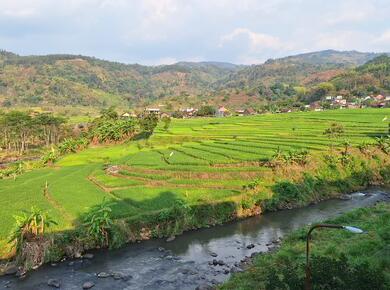Posted: September 5, 2024
The environmental crisis and our mandate to care for creation
A word of encouragement from the MWC Faith & Life Commission and the Creation Care Task Force.
Part 2 of 2
“Creation care” is taking on ever-increasing urgency.
The news reminds us daily of alarming changes in our climate. We are witnessing terrible violence against God’s beloved creation. And we are increasingly aware of how much we share in the harm, both as sinners and as sinned-against.
How do we respond?
Our answers will surely vary depending on where we live, on our resources, the depth of our faith, our theology and on our willingness to respond to the call of the moment.
Human sinfulness has broken our relationship with God, with each other, and with creation in all its diversity. But the gracious and liberating Spirit of God is bringing about “new creation” in and through Christ (2 Corinthians 5:17).
What is that Spirit saying to us at this time?
The MWC Tagline and Creation Care
Not surprisingly, the MWC tagline “Following Jesus, Living Out Unity, Building Peace” echoes the Shared Convictions. The Spirit can use it to aid us in our environmental faithfulness.
Following Jesus
The tagline gives first place to “following Jesus.” The Jesus we have pledged to follow is not only the healer and teacher of the Gospels, but also the Christ who creates and holds all creation together in his transforming and re-creating embrace (Colossians 1:17). We cannot follow Jesus without sharing in the Creator’s redeeming love for this world—all of it! We cannot follow him without loving care, simplicity, and generosity.
Living out Unity
The second item is “living out unity.” The heart of Jesus’ prayer for us as his followers in John 17 is that we may be one. With whom are we to be one? With whom are we to live out unity?
Jesus’ first concern is that we be one with him as he is one with his (and our!) Father (John 17:21-23). Unity with God means that we share in the love of the Creator for the whole cosmos* (John 3:16, 17). We too are to be the “light of the cosmos,” as Jesus says in the Sermon on the Mount (Matthew 5:14, John 3:21).
As the body of that creating and redeeming Christ we are to participate as caretakers, custodians, and guardians of creation. Just as the sabbath was God’s great act of creation care (Leviticus 25), we honour the sabbath when we allow creation to rest from our ceaseless and careless exploitation of earth’s bounty.
Second, we are to be one with each other, sparing no effort to maintain the unity the Spirit creates (Ephesians 2:18; 4:3). We live out this unity in active solidarity with those in the body of Christ who are suffering the effects of the environmental crisis (1 Corinthians 12:26). This solidarity extends to all of humanity, and will be tested more and more as the impact on vulnerable populations increases.
We live this unity out also by praying for each other to have the courage to stop harming creation, and thereby each other. We have much to confess, much to forgive and much to change as we walk in unity as the body of Christ.
Third, God’s “gathering up all things in heaven and on earth in Christ” (Eph 1:10) reminds us of our deep unity with the whole of creation, a unity of all things in Christ. We rejoice in creation’s beauty and its bounty. But we also share in God’s grief when creation suffers, especially when it is at our hands.
So we confess and repent of our refusal to listen to the suffering of creation and our failure to live up to Jesus’ mandate to us as disciples, namely, to proclaim the gospel of salvation to all creation (Mark 16:15).
Fourth, we are not only in unity with God, but God is in unity with us. We are not alone. The Spirit, the breath of life the Creator lends to all creation, indwells us, guiding, sustaining, and empowering us in our resolve to be faithful (Romans 8:9-27, 1 Corinthians 12, Galatians 5:22-25, Ephesians 4:4, Phil 2:12, 13). We dare not quench or grieve this Spirit (1 Thessalonians 5:19) by neglecting to join in the Creator’s love and care for our earthly home.
Building Peace
The third element in the tagline is “building peace.” The Hebrew word for peace is shalom, which above all means “wholeness” and “well-being.” Shalom best characterizes that first sabbath when God looked upon creation in all its material reality and called it “very good” (Genesis 1:25; 2:2-3).
To commit ourselves to “building peace” is to do all we can to turn from our ruinous ways and to engage as co-creators with God in the “ministry of reconciliation” (2 Corinthians 5:16-21, Colossians 1:20), including care for creation in all its diversity. Building peace is working at restoring creation to wholeness, where peace and justice will once again embrace and kiss each other (Psalm 85:10).
The Ground of Our Hope
We struggle with troubling questions: Is there hope for this world? Can we really make a difference with our limited knowledge, energy, and resources? Or will this world pass away soon, regardless of our efforts? What should we hope for?
The Shared Convictions conclude with these words:
“We seek to walk in [Jesus’] name by the power of the Holy Spirit, as we confidently await Christ’s return and the final fulfillment of God’s kingdom.”
“Confident waiting” is one way to speak of hope. This hope in God’s future must, however, never be an escape from our responsibility here and now. Hope propels us to act now, where we are. Such hope is not optimism, nor does it rest on our resilience or inventiveness. It rests fully on God’s faithfulness.
The love that the Creator pours into our hearts through the Spirit (Romans 5:1-5) empowers us to act with hope as the body of the Christ who gave his life to save this cosmos. We work with hope even as we wait in faith. All creation is groaning in eager anticipation of us putting our hope-filled faith into practice (Romans 8:22; Hebrews 11:1; 12:12-15).
Today we might thus restate the concluding sentence of the Shared Convictions as follows: “We seek to walk by the power of the life-giving Spirit in the name of Jesus Christ through whom all things are created, redeemed and sustained, as we eagerly and actively await the shalom the final fulfillment of God’s kingdom will bring.”
Let us ask the Spirit for clarity and vision to help us respond faithfully to the challenge of our day.
Let us pledge to practice loving care and patience with each other as we walk this challenging path together.
Let us prayerfully support the Creation Care Task Force and all the many efforts to respond to the crisis we face together.
That is our prayer for the MWC family of faith.
The earth is the Lord’s and all that is in it, the world, and those who live in it. Psalm 24:1
- Thomas R Yoder Neufeld, chair of the Faith and Life Commission, a member of First Mennonite Church, Kitchener, Ontario, Canada;
- Anicka Fast, secretary of the Faith & Life Commission, a member of Doopsgezind Gemeente Bussum-Naarden, Netherlands;
- Doug Graber Neufeld, chair of the Creation Care Task Force, a member of Community Mennonite Church, Harrisonburg, Virginia, USA
- with the members of the Faith & Life Commission and the Creation Care Task Force.
* On the earliest manuscripts, “world” in John 3:16 is given in Greek as cosmos which pushes our imaginations to account for much more than the human experience.
Missed Part 1 last month? Read “God so loved the cosmos…”
Find Season of Creation resources from Mennonite churches:
“Creation” – Algemene Doopsgezind Nederland
https://doopsgezinden.nl/wp-content/uploads/2024/08/Kopie-van-vierbrief-240812.pdf
To Hope and Act with Creation – Mennonite Church USA and Canada
#seasonofcreation
#seasonofcreation2024




Comments: